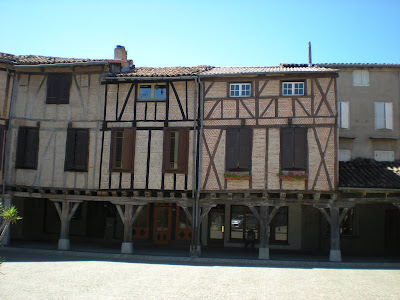But plenty of visitors tread its streets each year thanks largely to its status as one of "Les Plus Beaux Villages de France" (The most beautiful villages of France), its proximity to the striking city of Albi, and yes...the garlic.
Now it's not often you can say you've been to one of the garlic capital's of the world - and it's not something you might want to admit to - but l'ail rose de Lautrec (or pink garlic to the rest of us) is apparently "recognised by gourmets as prince of seasonings, with a flavour that is particularly sought after" and its growth and harvesting are strictly certified and confined to the clay-chalky hillsides surrounding the village.
For those Garlicophiles among you (there must be some) try checking out these sites for more information (both in English); the first one is a tourist site for Tarn and the second is dedicated solely to Lautrec's pink garlic.
Oh yes, and if that isn't enough, you might want to give the recipe for pink garlic soup in the photo a bash.
Yum.
Anyway, moving on rapidly from garlic, Lautrec is one of three villages in the département of Tarn (along with Castelnau de Montmiral and Puycelsi) belonging to the independent association of "Les Plus Beaux Villages de France" whose aim is to "protect and promote" French villages (of fewer than 2,000 inhabitants) which it deems to have "outstanding heritage" and which have "not turned into soulless museums or 'theme parks'".
Lautrec fits the bill perfectly.
A 30-kilometre drive from the département's main city of Albi, a Unesco World Heritage site since August 2010, and just 15 kilometres away from the second city of Castres, Lautrec is a gem with bags of historical and architectural interest for a place that boasts barely 1,700 local Lautrécois or Lautrécoises.

Make your way up to 17th century mill almost near the peak of la Colline de la Salette and take a moment to catch your breath and admire how well it has been restored before going further for a panoramic view of the village.
Take the steps down the village lane - mind how you go - and pay a visit to L'église Saint-Rémy (Saint-Rémy church) dating back to the 14th century, listed as an Historic Monument in France since 1999 and one of the village landmarks. You can't miss it.
Throughout the village you can admire the beautifully maintained traditional half-timbered houses, the 15th century market place and visit the underground grain silos all of which, according to the village's official website, "make it a veritable living history book".
For more of a taste as to what Lautrec has to offer, take a look at the accompanying YouTube video which is a diaporama of one visitor's impressions.
And finally if you do pay the place a visit and are looking for somewhere to stay, then check out the 17th century La Terrasse de Lautrec, a bed and breakfast on rue de l'Eglise in the heart of the village, a member of the French Chambres d'Hôtes de Charme and whose magnificent front door is just asking to be knocked...very loudly.
Bon voyage.





































































